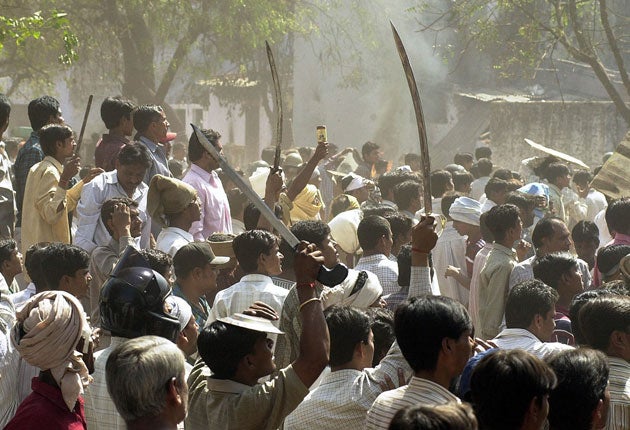Tribunals set up to examine slaughter of Indian Muslims
Politician tipped to be next PM investigated for his role in 2002 sectarian riots

Your support helps us to tell the story
From reproductive rights to climate change to Big Tech, The Independent is on the ground when the story is developing. Whether it's investigating the financials of Elon Musk's pro-Trump PAC or producing our latest documentary, 'The A Word', which shines a light on the American women fighting for reproductive rights, we know how important it is to parse out the facts from the messaging.
At such a critical moment in US history, we need reporters on the ground. Your donation allows us to keep sending journalists to speak to both sides of the story.
The Independent is trusted by Americans across the entire political spectrum. And unlike many other quality news outlets, we choose not to lock Americans out of our reporting and analysis with paywalls. We believe quality journalism should be available to everyone, paid for by those who can afford it.
Your support makes all the difference.Seven years after hundreds of Muslims in Gujarat were murdered in some of India's most vicious religious violence since partition, the families of those who died are a step closer to justice after the Supreme Court ordered the setting up of fast-track tribunals. Among the people to be investigated will be the state's controversial chief minister, Narendra Modi, a man tipped as a future prime minister of India.
The court order, which came in the middle of India's general election, instructs legal authorities in Gujarat to establish tribunals to examine 14 outstanding cases relating to the 2002 killings. "You can be assured of a quick and fair trial now and that was very urgently needed. It is great news for the riot victims who had been waiting for justice," said Mukul Sinha, a lawyer representing some of the victims.
The so-called "Gujarat riots" that swept through parts of the western state in the spring of 2002 left as many as 2,000 people dead, the overwhelming majority of them Muslims. The trigger for the violence was a fire on a train carrying Hindu pilgrims that killed around 60 people, which was alleged to have been started by a Muslim mob. Inquiries have suggested that the blaze on the Sabarmati Express was an accident. Either way, what followed was a sustained slaughter of Muslims.
Houses were set on fire, people were burned alive, others fled for their lives. While some officials claimed that the violence was a spontaneous reaction to the train fire, there is persuasive evidence – such as the easy access of the mob to land registry records – to suggest the violence was at least partly planned. There have been persistent accusations that the Bharatiya Janata Party (BJP), which was in charge of the state, and chief minister Mr Modi played a crucial role in the violence.
In Gujarat, the wounds of 2002 have never healed. While the BJP was subsequently twice re-elected to state office – largely on the back of a booming economy and of Mr Modi's profile as a man who would "protect" Hindus – thousands of Muslims remain in refugee camps on the fringes of Ahmedabad, unable (in some cases too afraid) to return to their villages. For many in India, the failure to properly address what happened remains a painful sore.
The Supreme Court has also ordered an inquiry into allegations that Mr Modi failed to stop – and may even have encouraged – the 2002 violence. Earlier, one of his ministers in the Gujarat state assembly, Maya Kodnani, gave herself up to the authorities after a special investigating team accused of her leading mobs. Both she and Mr Modi deny the allegations against them.
Among the individual cases that will be looked at by the newly ordered tribunals will be the burning of the Sabarmati Express, the killing of up to 95 people in the Naroda Patia neighbourhood of Ahmedabad and the murder of Ehsan Jafri, a senior Muslim politician from the Congress Party. A 2007 investigation by the Tehelka news magazine discovered that Mr Ehsan was murdered despite frantically calling Mr Modi's office for help.
"Five or six people held him, then someone struck him with a sword, chopped off his hand, then his legs, then everything else," the magazine quoted one of those accused as saying. "After cutting him to pieces they put him on the wood they'd piled and set it on fire ... burnt him alive."
Narendra Modi: Rise of the 'modern-day Nero'
Few Indian politicians can match Narendra Modi for confidence and swagger. None comes close for stirring controversy.
If, as expected, the Bharatiya Janata Party (BJP) fail to secure power in this election, many expect that Mr Modi will seamlessly take control and push aside the party leader, LK Advani.
It would be a remarkable achievement for a man was once described by the Indian Supreme Court as a "modern-day Nero", and was refused a US visa on the grounds he had "violated religious freedom".
But Mr Modi, 59, has worked hard to project himself as a tough leader, ready for the national stage. He has promoted Gujarart as one of India's leading business locations and was able to lure industrial Ratan Tata to build his much vaunted Nano "people's car" in the state.
During the election campaign, Mr Modi has been a star performer, mocking the Congress party as an "old woman". Such is his popularity that plastic masks of the well-dressed politician are among the election's bestsellers.
But Mr Modi, whose estranged, never-talked-about wife lives alone in a Gujarat village, is yet to deal with the religious riots of 2002. He has always denied involvement but accusations continue to dog him.
Join our commenting forum
Join thought-provoking conversations, follow other Independent readers and see their replies
Comments